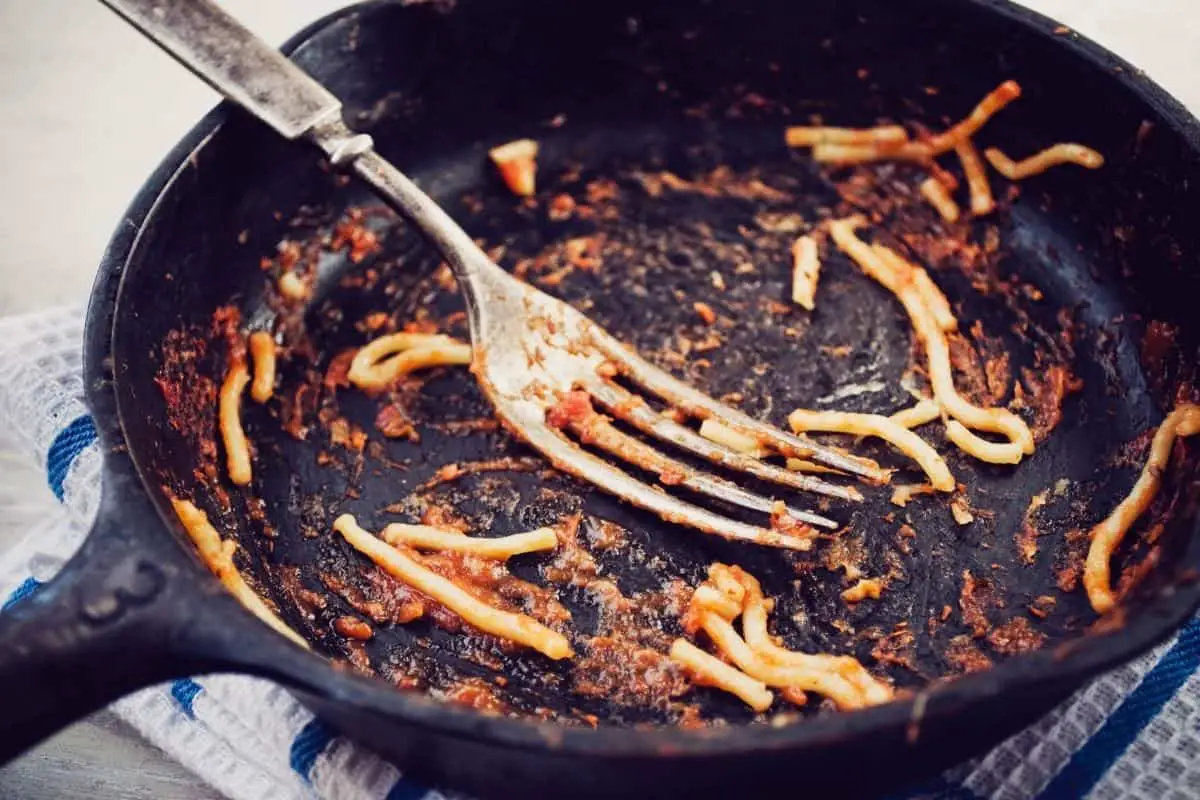Table of Contents
- Why does my cast iron skillet turn food black?
- Factors that cause the blackening of food in cast iron skillets and how to beat them!
- Related Questions
- Conclusion
Why does my cast iron skillet turn food black?
Your cast iron skillet is a favorite that you’ve had for years and it’s been the perfect pan to use in your kitchen. But when you start cooking, you notice food turns black when cooked.
Why does this happen? If you have this question in your mind, this blog post is for you. Read on to find out why does this happens, and what can you do about it!
Factors that cause the blackening of food in cast iron skillets and how to beat them!
Cast iron skillets are often used by cooks because they can withstand high temperatures without warping or cracking. They also have a natural non-stick coating that helps prevent foods from sticking but eventually wears off over time.
So what happens with cast iron skillets?
Many factors are involved when food is turned black in your favorite cast-iron skillet.
The metal reacts to acidic foods like tomatoes and citrus fruits, or the seasoning comes off which causes the blackening effect. But don’t worry, this doesn’t always affect the taste of your delicious meal! There are some things you can do if you want to avoid it. Let’s see what are the causes and how to beat them right away!
Overcooking the oil
This is the main reason why the cast iron skillets turn food black. If you are overcooking the oil on high-medium heat, the oil will start to burn, which in turn causes the food to burn when you put it on.
How to prevent it?
To avoid this mistake, cook with lower-medium heat and just add a tablespoon of oil at a time. Also, once you are done cooking, clean your cast iron skillet while it’s still hot so that any leftover particles come off easily.
Leftovers in the pan
The leftover particles tend to burn if left on your skillet for too long, which can cause the blackening of food later on. So it’s best not to leave any food unattended on your cast iron skillet.
How to prevent it?
Never leave the leftover while the skillet is on the stove. Give it a quick wash right away before storing it in the cupboard. Also, if you are not going to use your cast iron skillet for a while, make sure to coat the entire surface with a thin layer of oil and store it in a cool dry place.
Not seasoning the skillet enough
If you don’t season your cast iron skillet enough, it will cause food to stick. Once the food sticks on the skillet, it’s easier for it to get burnt over time which causes the blackening of food.
How to prevent it?
To avoid this mistake, make sure to season the skillet properly every time after use. In order to season the skillet, make sure to coat the entire surface with a thin layer of oil and heat it on medium-high for 10 – 15 minutes. Also, make sure that the oil is heated evenly by rotating your skillet or by using tongs.
Citrus fruits
Tomatoes and citrus fruits like lime and lemon can cause the blackening of food when cooked over time. This is because these types of foods are acidic and react when in contact with the iron skillet.
How to prevent it?
To avoid this mistake, cook these types of foods on low-medium heat for short periods of time, so that the food doesn’t stick in your cast iron skillet. Also, don’t let them stay on the pan longer than necessary.
Rusting
Yes, you heard it right. Rusting can make food turn black! This usually happens when the water of the food mixes with the iron in your skillet, causing it to turn black.
How to prevent it?
To avoid rusting, always make sure to dry the skillet before you put it away and keep it in a cool and dry place. In order to fix the rusting, use a paper towel and some salt, and rub it on the surface of the skillet. Rinse with warm water and dry it right away before storing it in the cupboard.
Seasoned coating
One cause of your food turning black in a cast-iron skillet can be just the black coating of a seasoned skillet. The seasoning sticks to the food and eventually, your food turns black. But remember, the seasoning isn’t harmful to health.
How to prevent it?
In order to prevent the seasoning to damage the food, make sure to coat with oil or butter before cooking. This way, the seasoning coating will not come off.
It’s important to remember that even if your food turns black, it doesn’t affect its taste. The seasoning will also become more seasoned over time which will reduce the problem. However, if there are certain foods that tend to turn your cast iron skillets into discolored messes, try to avoid cooking them whenever you can.
Related Questions
Is blackened food injurious to health?
It depends. If the food turns black due to burning, then of course it is bad for your stomach. On the other hand, if the food is naturally black, then it is not. For example, the blackening of cast iron skillets come from its seasoning which is collected by food when cooking.
Other than citrus fruits which foods turn black while cooking in cast-iron skillet?
In addition to tomatoes and citrus fruits, there are some vegetables that turn black. For instance, green and leafy vegetables like spinach, kale, and collard greens. Also, some seafood such as scallops and shrimp turn black while cooking in a cast-iron skillet because they are naturally dark.
Conclusion
In a nutshell, food can turn black in a cast-iron skillet for various reasons. The blackening of the food usually comes from either burning it or from reacting with the iron found in a seasoned cast-iron pan. In order to prevent these mistakes, always remember to heat on a low-medium flame and avoid overcooking your vegetables.
Follow the above-mentioned precautions and solutions and devour the foods cooked in your favorite cast iron skillet!




